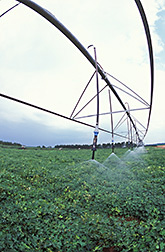This page has been archived and is being provided for reference purposes only. The page is no longer being updated, and therefore, links on the page may be invalid.
Read the magazine story to find out more. |
|
Irrigation for Southeast U.S. Crops
By Sharon DurhamNovember 15, 2005
Irrigation pays off: That’s the message from Agricultural Research Service (ARS) scientists in Dawson, Ga., for peanut, corn and cotton farmers.
Marshall Lamb and his colleagues at the ARS National Peanut Research Laboratory (NPRL) are conducting long-term, multicrop research at a farm location to define the best irrigation management practices for growers of peanuts, corn and cotton. Results from the study’s fourth year indicate that irrigation, when done properly, pays off.
Peanuts, a major crop in the southeastern United States, suffered reduced yields of about 11 percent during a drought in the 1980s. Proper management of irrigation resources could increase yields even in years of adverse weather conditions, according to Lamb.
In the study, planned to run for 15 years, crops of corn, cotton and peanuts are grown in six crop rotation sequences. Some crops are not irrigated at all, while others are irrigated in amounts of 100 percent, 66 percent, and 33 percent of their estimated water need.
Georgia was in a prolonged drought--from 1998 to 2003--during part of the study. In the first year of the study, 2001, the drought was quite pronounced, and it deepened in 2002.
In peanuts in 2002, the study showed that irrigation resulted in similar yields when using either 100 percent or 66 percent irrigation levels. Even though yields were slightly higher (5,130 pounds per acre) when using 100 percent irrigation, compared with 5,065 pounds using 66 percent irrigation, the cost for the water--$125 per acre--wiped out the benefit of the higher yields, according to Lamb. At 100 percent irrigation, the study showed a grower would net $197, compared with $198 per acre using 66 percent irrigation.
Read more about this research in the November 2005 issue of Agricultural Research magazine.
ARS is the U.S. Department of Agriculture’s chief scientific research agency.

